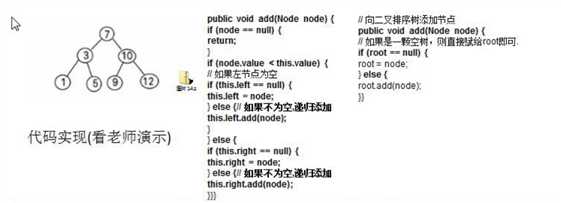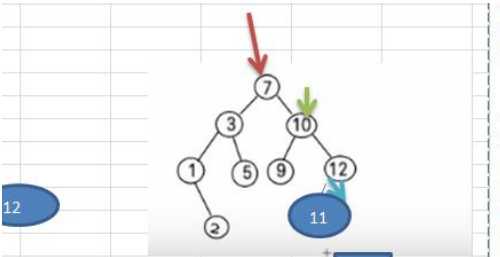树结构实际应用之 二叉排序树
Posted pierceming
tags:
篇首语:本文由小常识网(cha138.com)小编为大家整理,主要介绍了树结构实际应用之 二叉排序树相关的知识,希望对你有一定的参考价值。
二叉排序树
二叉排序树介绍:
二叉排序树:BST: (Binary Sort(Search) Tree), 对于二叉排序树的 任何一个非叶子节点,要求 左子节点的值比当前节点的值小, 右子节点的值比当前节点的值大。
特别说明:如果有相同的值,可以将该节点放在左子节点或右子节点
比如针对前面的数据 (7, 3, 10, 12, 5, 1, 9) ,对应的二叉排序树为:

二叉排序树创建和遍历:
一个数组创建成对应的二叉排序树,并使用中序遍历二叉排序树,比如: 数组为 Array(7, 3, 10, 12, 5, 1, 9) , 创建成对应的二叉排序树为 :

二叉排序树的删除:
二叉排序树的删除情况比较复杂,有下面三种情况需要考虑:
1) 点 删除叶子节点 (比如:2, 5, 9, 12)
2) 删除点 只有一颗子树的节点 (比如:1)
3) 删除 有两颗子树的节点. (比如:7, 3,10 )
- 操作的思路分析:

//对删除结点的各种情况的思路分析:
第一种情况:
删除叶子节点 (比如:2, 5, 9, 12)
思路
(1) 需求先去找到要删除的结点 targetNode
(2) 找到 targetNode 的 父结点 parent
(3) 确定 targetNode 是 parent 的左子结点 还是右子结点
(4) 根据前面的情况来对应删除
左子结点 parent.left = null
右子结点 parent.right = null;
第二种情况: 删除只有一颗子树的节点 比如 1
思路
(1) 需求先去找到要删除的结点 targetNode
(2) 找到 targetNode 的 父结点 parent
(3) 确定 targetNode 的子结点是左子结点还是右子结点
(4) targetNode 是 parent 的左子结点还是右子结点
(5) 如果 targetNode 有左子结点
5. 1 如果 targetNode 是 parent 的左子结点
parent.left = targetNode.left;
5.2 如果 targetNode 是 parent 的右子结点
parent.right = targetNode.left;
(6) 如果 targetNode 有右子结点
6.1 如果 targetNode 是 parent 的左子结点
parent.left = targetNode.right;
6.2 如果 targetNode 是 parent 的右子结点
parent.right = targetNode.right
情况三 : 删除有两颗子树的节点. (比如:7, 3,10 )
思路
(1) 需求先去找到要删除的结点 targetNode
(2) 找到 targetNode 的 父结点 parent
(3) 从 targetNode 的右子树找到最小的结点
(4) 用一个临时变量,将 最小结点的值保存 temp = 11
(5) 删除该最小结点
(6) targetNode.value = temp
代码实现:
package com.pierce.algorithm;
public class BinarySortTreeDemo {
public static void main(String[] args) {
int[] arr = {7, 3, 10, 12, 5, 1, 9, 2};
BinarySortTree binarySortTree = new BinarySortTree();
//循环的添加结点到二叉排序树
for (int i = 0; i < arr.length; i++) {
binarySortTree.add(new Node5(arr[i]));
}
//中序遍历二叉排序树
System.out.println("中序遍历二叉排序树~");
binarySortTree.infixOrder(); // 1, 3, 5, 7, 9, 10, 12
//测试一下删除叶子结点
binarySortTree.delNode5(12);
binarySortTree.delNode5(5);
binarySortTree.delNode5(10);
binarySortTree.delNode5(2);
binarySortTree.delNode5(3);
binarySortTree.delNode5(9);
binarySortTree.delNode5(1);
binarySortTree.delNode5(7);
System.out.println("root=" + binarySortTree.getRoot());
System.out.println("删除结点后");
binarySortTree.infixOrder();
}
}
//创建二叉排序树
class BinarySortTree {
private Node5 root;
public Node5 getRoot() {
return root;
}
//查找要删除的结点
public Node5 search(int value) {
if (root == null) {
return null;
} else {
return root.search(value);
}
}
//查找父结点
public Node5 searchParent(int value) {
if (root == null) {
return null;
} else {
return root.searchParent(value);
}
}
//编写方法:
//1. 返回的 以 Node5 为根结点的二叉排序树的最小结点的值
//2. 删除 Node5 为根结点的二叉排序树的最小结点
/**
* @param Node5 传入的结点(当做二叉排序树的根结点)
* @return 返回的 以 Node5 为根结点的二叉排序树的最小结点的值
*/
public int delRightTreeMin(Node5 Node5) {
Node5 target = Node5;
//循环的查找左子节点,就会找到最小值
while (target.left != null) {
target = target.left;
}
//这时 target 就指向了最小结点
//删除最小结点
delNode5(target.value);
return target.value;
}
//删除结点
public void delNode5(int value) {
if (root == null) {
return;
} else {
//1.需求先去找到要删除的结点 targetNode5
Node5 targetNode5 = search(value);
//如果没有找到要删除的结点
if (targetNode5 == null) {
return;
}
//如果我们发现当前这颗二叉排序树只有一个结点
if (root.left == null && root.right == null) {
root = null;
return;
}
//去找到 targetNode5 的父结点
Node5 parent = searchParent(value);
//如果要删除的结点是叶子结点
if (targetNode5.left == null && targetNode5.right == null) {
//判断 targetNode5 是父结点的左子结点,还是右子结点
if (parent.left != null && parent.left.value == value) { //是左子结点
parent.left = null;
} else if (parent.right != null && parent.right.value == value) {//是由子结点
parent.right = null;
}
} else if (targetNode5.left != null && targetNode5.right != null) { //删除有两颗子树的节点
int minVal = delRightTreeMin(targetNode5.right);
targetNode5.value = minVal;
} else { // 删除只有一颗子树的结点
//如果要删除的结点有左子结点
if (targetNode5.left != null) {
if (parent != null) {
//如果 targetNode5 是 parent 的左子结点
if (parent.left.value == value) {
parent.left = targetNode5.left;
} else { // targetNode5 是 parent 的右子结点
parent.right = targetNode5.left;
}
} else {
root = targetNode5.left;
}
} else { //如果要删除的结点有右子结点
if (parent != null) {
//如果 targetNode5 是 parent 的左子结点
if (parent.left.value == value) {
parent.left = targetNode5.right;
} else { //如果 targetNode5 是 parent 的右子结点
parent.right = targetNode5.right;
}
} else {
root = targetNode5.right;
}
}
}
}
}
//添加结点的方法
public void add(Node5 Node5) {
if (root == null) {
root = Node5;//如果 root 为空则直接让 root 指向 Node5
} else {
root.add(Node5);
}
}
//中序遍历
public void infixOrder() {
if (root != null) {
root.infixOrder();
} else {
System.out.println("二叉排序树为空,不能遍历");
}
}
}
//创建 Node5 结点
class Node5 {
int value;
Node5 left;
Node5 right;
public Node5(int value) {
this.value = value;
}
//查找要删除的结点
/**
* @param value 希望删除的结点的值
* @return 如果找到返回该结点,否则返回 null
*/
public Node5 search(int value) {
if (value == this.value) { //找到就是该结点
return this;
} else if (value < this.value) {//如果查找的值小于当前结点,向左子树递归查找
//如果左子结点为空
if (this.left == null) {
return null;
}
return this.left.search(value);
} else { //如果查找的值不小于当前结点,向右子树递归查找
if (this.right == null) {
return null;
}
return this.right.search(value);
}
}
//查找要删除结点的父结点
/**
* @param value 要找到的结点的值
* 尚硅谷 Java 数据结构和算法
* 更多 Java –大数据 –前端 –python 人工智能 -区块链资料下载,可访问百度:尚硅谷官网
* 第 307页
* @return 返回的是要删除的结点的父结点,如果没有就返回 null
*/
public Node5 searchParent(int value) {
//如果当前结点就是要删除的结点的父结点,就返回
if ((this.left != null && this.left.value == value) ||
(this.right != null && this.right.value == value)) {
return this;
} else {
//如果查找的值小于当前结点的值, 并且当前结点的左子结点不为空
if (value < this.value && this.left != null) {
return this.left.searchParent(value); //向左子树递归查找
} else if (value >= this.value && this.right != null) {
return this.right.searchParent(value); //向右子树递归查找
} else {
return null; // 没有找到父结点
}
}
}
@Override
public String toString() {
return "Node5 [value=" + value + "]";
}
//添加结点的方法
//递归的形式添加结点,注意需要满足二叉排序树的要求
public void add(Node5 Node5) {
if (Node5 == null) {
return;
}
//判断传入的结点的值,和当前子树的根结点的值关系
if (Node5.value < this.value) {
//如果当前结点左子结点为 null
if (this.left == null) {
this.left = Node5;
} else {
//递归的向左子树添加
this.left.add(Node5);
}
} else { //添加的结点的值大于 当前结点的值
if (this.right == null) {
this.right = Node5;
} else {
//递归的向右子树添加
this.right.add(Node5);
}
}
}
//中序遍历
public void infixOrder() {
if (this.left != null) {
this.left.infixOrder();
}
System.out.println(this);
if (this.right != null) {
this.right.infixOrder();
}
}
}
以上是关于树结构实际应用之 二叉排序树的主要内容,如果未能解决你的问题,请参考以下文章